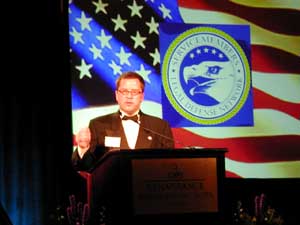-
- California court hears same-sex marriage arguments
- Military – year in review
- L.A. may settle discrimination lawsuits filed by gay police officers
- Year-end look at people that shaped GLBT community news
- Drug makers putting complete AIDS treatment in one daily pill
- Utah school reverses policy on same-sex couples attending dances
- National News Briefs
- World News Briefs
national
Military – year in review
Signs of hope for end to anti-gay policy
Published Thursday, 30-Dec-2004 in issue 888
The effort to roll back the anti-gay military policy known as “Don’t Ask, Don’t Tell” (DADT) can be compared to the trench warfare of World War I, where the battle lines remain static for long periods of time, with only modest incremental changes. This past year saw small but encouraging signs that the effort is moving in the right direction.
Gays and lesbians continued to be discharged under DADT but there was a sense that the policy was being more fairly administered. However, there is a lingering fear that it may be only temporary, due in part to the manpower needs of the war in Iraq.
Anti-gay harassment within the ranks is abating. This was reflected in survey numbers showing that younger soldiers, just like their civilian counterparts, are more accepting of gays and lesbians. Their older colleagues lag behind.
GLBT advocates eagerly watched to see how the military system of justice would apply the Lawrence v. Texas decision by the U.S. Supreme Court within the military context. That June 2003 decision threw out state sodomy laws.
A partial answer came at the end of August when the United States Court of Appeals for the Armed Forces largely ducked the constitutional question in United States v. Marcum. Instead, it focused on the facts that the consensual sodomy had occurred within a chain of command, and thus was more akin to statutory rape.
A better answer came in early December from the U.S. Army Court of Criminal Appeals when it applied Lawrence to United States v. Bullock, a case of voluntary oral sex involving a male soldier and a female civilian.
“What’s most remarkable about the case is that the Court of Appeals concluded that sex in the barracks itself has an insufficient military connection to overcome the essentially private and personal character of that activity,” said James Garland, a professor at Hofstra Law School.
The Pentagon still may appeal the decision.
The criminality of engaging in sodomy was one of the props used to justify DADT. The Lawrence decision knocked that out. Pro-gay advocates used Lawrence as an opportunity to launch new constitutional attacks against the policy.
In a surprise move in October, Log Cabin Republicans filed a challenge in Los Angeles on behalf of its unnamed members who currently are serving in the armed forces.
The Servicemembers Legal Defense Network (SLDN) filed its suit in Boston, in December. Their plaintiffs were a dozen men and women from different branches of the service who had been kicked out under DADT. They all sought reinstatement into the armed forces.
Both cases are being handled on a pro-bono basis by highly prestigious law firms. One or both of them are likely to end up before the U.S. Supreme Court in two to five years.
In October, SLDN executive director C. Dixon Osburn announced that SLDN would seek to have a bill introduced in Congress to repeal DADT. He acknowledged that it likely would be several years before a vote is cast on repeal.
He said, “We hope to end, once and for all, the ban on gays in the military…. It is unconstitutional and contrary to our national security interests.”
|
|
Copyright © 2003-2025 Uptown Publications


